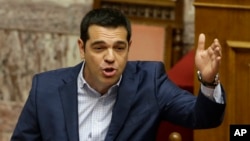Prime Minister Alexis Tsipras on Friday acknowledged his government had made covert contingency plans in case Greece was forced out of the euro, but rejected accusations he had plotted to take the country back to the drachma.
Tsipras was forced to respond to the issue in parliament after former finance minister Yanis Varoufakis this week revealed efforts to hack into citizens' tax codes to create a parallel payment system, prompting shock and outrage in Greece.
The disclosure heaped new pressure on Tsipras, who is also battling a rebellion within his Syriza party and starting tough talks with the European and International Monetary Fund to seal a third bailout programme in less than three weeks.
"We didn't design or have a plan to pull the country out of the euro, but we did have emergency plans," Tsipras told parliament. "If our partners and lenders had prepared a Grexit plan, shouldn't we as a government have prepared our defense?"
He compared the plan to a country preparing its defenses ahead of war, saying it was the obligation of a responsible government to have contingency plans in place.
He did not directly refer to Varoufakis' disclosure of plans to hack into his ministry's software to obtain tax codes, but said but said the idea of a database giving Greeks passwords to make payments to settle arrears was hardly "a covert and satanic plan to take the country out of the euro."
Tsipras also defended his embattled former finance minister, who has continued to create headaches for the government since being ousted earlier this month.
"Mr. Varoufakis might have made mistakes, as all of us have... You can blame him as much as you want for his political plan, his statements, for his taste in shirts, for vacations in Aegina," Tsipras said.
"But you cannot accuse him of stealing the money of Greek people or having a covert plan to take Greece to the precipice."
Tsipras's comments came as Greece began talks with the mission chiefs of the quartet of creditors - the European Commission, European Central Bank, IMF and the European bailout fund — to nail down a third bailout of up to 86 billion euros.
The meeting with Greece's finance and economy ministers got under way at a hotel in central Athens rather than at government ministries, part of efforts to keep the visit by EU/IMF officials discreet and less intrusive than in the past.





